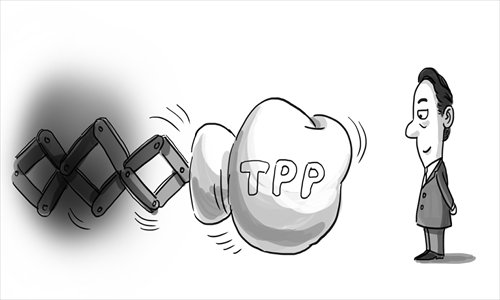Agreement centered on protectionism, not free trade

Illustration: Liu Rui/GT
Apparently, news that the US, Japan and 10 other Pacific Rim nations have finalized the Trans-Pacific Partnership (TPP) agreement has made many Chinese over-upset and many Americans over-thrilling. It's a pity that people tend to seek as simple as possible answers when the global affairs become increasingly complicated. Just as China has realized the establishment of the Asian Infrastructure Investment Bank is a major test instead of a smashing victory, the TPP is no panacea for the US economic plight.
Clyde Prestowitz, president of the Economic Strategy Institute, published an article in the Los Angeles Times this January titled "The Trans-Pacific Partnership won't deliver jobs or curb China's power," in which he argues that "US leaders promised [previous free-trade] deals would create high-paying jobs, reduce the trade deficit, increase GDP and raise living standards. But none of this came true." Statistics released by the Economic Policy Institute show that since 1997, US manufacturing has lost 5.5 million jobs.
An estimate by the Peter G. Peterson Institute for International Economics projects a meager 0.13 percent increase to the US GDP by 2025 from the TPP. A few US research institutes, including the Economic Strategy Institute, believe that the TPP would only serve to worsen the US unemployment situation, adding burdens on ordinary American consumers.
It's US President Barack Obama's Democratic colleagues, rather than the Republicans, that have been speaking most loudly against the TPP. Democratic presidential candidate Hillary Clinton gave the deal a thumbs down in an interview Wednesday, breaking with Obama and his administration.
Not all US enterprises are happy with the deal. In the TPP negotiations, the US government asked Vietnam to reduce textile imports from China in return for preferential access to the US market. Although this will increase US textile exports to Vietnam, it encountered resistance from clothing corporations because, as they argued, this will also cause a substantial rise in the cost of clothing imports from Vietnam.
There are also other harsh criticisms annoying Obama in his attempts to define the TPP as part of his political legacy. Yale University Professor Immanuel Wallerstein said that the TPP deal is obviously based first of all on political, not economic, considerations and the exclusive agreement is "not really based on free trade but rather on protectionism." Some others argued that as it contains overly harsh intellectual property protection provisions, the TPP agreement may be detrimental to social development and public welfare, only benefiting Hollywood and the pharmaceutical industry.
The TPP deal will only make the international trade more complicated and expensive, spoiling the hopes of under-developed countries for leapfrog development. In order to break the siege from opponents and push forward the TPP deal, the Obama administration adopted an aggressive approach. Obama in his 2015 State of the Union address said that "If we don't write the rules, China will write the rules out in that region." After that he held on to emphasize this point at many occasions, stressing the strategic value of the TPP in counterbalancing China's geopolitical influence. The approach seems to be rather effective, because many congressmen have shown concerns with China's rapid rise. The White House struggles to portray the strategic significance of the TPP, which in fact indicates that it can hardly win support for the deal from an economic perspective.
Of course, it's over-optimistic to pin the hope of containment of China's development on the TPP deal. Just as Charles W. Freeman, former assistant secretary of defense for international security affairs, said, "No country in Asia wants to choose between political allegiance to the US and economic alignment with China." China currently is the biggest trading partner of over 120 countries, including many of the TPP member states. The huge China market is an opportunity of development that cannot be overlooked.
The TPP deal may be a victory for Washington, but it's also an embodiment of fragmentation of the world trade order. It's common to politicize trade problems nowadays and varied trade groups are undermining the importance of the WTO. State leaders tend to emphasize the strategic values of trade agreements, and this deserves vigilance of the international society.
The author is a research fellow at the Charhar Institute and an adjunct fellow at the Chongyang Institute for Financial Studies at Renmin University of China. opinion@globaltimes.com.cn